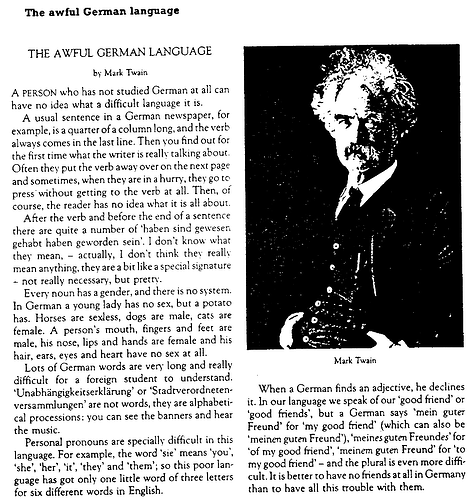Source: https://www.nonstopsystems.com/radio/pdf-hell/article-twain.pdf
The Awful German Language
THE AWFUL GERMAN LANGUAGE
by Mark Twain
A PERSON who has not studied German at all can have no idea what a difficult language it is.
A usual sentence in a German newspaper, for example, is a quarter of a column long, and the verb always comes in the last line. Then you find out for the first time what the writer is really talking about. Often they put the verb away over on the next page and sometimes, when they are in a hurry, they go to press without getting to the verb at all. Then, of course, the reader has no idea what it is all about.
After the verb and before the end of a sentence there are quite a number of ‘haben sind gewesen gehabt haben geworden sein’. I don’t know what they mean, - actually, I don’t think they really mean anything, they are a bit like a special signature - not really necessary, but pretty.
Every noun has a gender, and there is no system. In German a young lady has no sex, but a potato has. Horses are sexless, dogs are male, cats are female. A person’s mouth, fingers and feet are male, his nose, lips and hands are female and his hair, ears, eyes and heart have no sex at all.
Lots of German words are very long and really difficult for a foreign student to understand. ‘Unabhängigkeitsserklärung’ or ‘Stadtreverordnetenversammlungen’ are not words, they are alphabetical processions: you can see the banners and hear the music.
Personal pronouns are specially difficult in this language. For example, the word ‘sie’ means ‘you’, ‘she’, ‘her’, ‘it’, ‘they’ and ‘them’; so this poor language has not only one little word of three letters for six different words in English.
When a German finds an adjective, he declines it. In our language we speak of our ‘good friend’ or ‘good friends’, but a German says ‘mein guter Freund’ for ‘my good friend’ (which can also be ‘meinen guten Freund’, ‘meines guten Freundes’ for ‘of my good friend’, ‘meinem guten Freund’ for ‘to my good friend’ - and the plural is even more difficult. It is better to have no friends at all in Germany than to have all this trouble with them.
